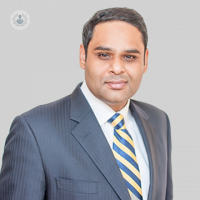Ask a respiratory physician: What are the effects of long COVID?
Written by:Most people who have COVID-19 will make a full recovery within three months of contracting the SARS-CoV-2 virus. Other people’s symptoms, however, will persist beyond that and could be termed long COVID.
Here to provide an expert insight into long COVID, including symptoms, impact and treatment, is Dr Amit Patel, leading Consultant Respiratory physician.

What is long COVID, and how has it affected the respiratory system?
Long COVID accounts for a constellation of symptoms and consequences after having contracted the SARS-CoV-2 virus.
These can include respiratory, cardiac, neurological, and general wellbeing symptoms, for example:
- Residual breathlessness
- Chest pain
- Feeling fatigued
- Brain fog
- Difficulties with concentration
- A general feeling of not being back to one’s ‘normal self’
- Dizziness at times
Patients can be impacted in many different ways, not just the respiratory system. Sometimes, patients may find that they are experiencing pains from only doing small things. Other times, the pains can be very variable. As a result, patients may struggle doing the activities they would usually do in their daily lives.
What are the most common respiratory long COVID symptoms?
The most common respiratory symptom is breathlessness, which can have differing impacts at differing levels. Some patients may just feel that they are not quite back to their normal selves. Having had COVID-19, I found I was not able to exercise at the same level as before contracting the virus for a couple of months.
Other patients can be very incapacitated and struggle to do simple tasks, like climbing stairs. As well as this, patients can also experience dizziness, chest pains, and palpitations.
Chronic cough is rarer as a long COVID feature. Patients who have a persistent cough lasting over three weeks are recommended to seek medical attention.
Is there treatment available for long COVID and associated respiratory symptoms?
This is a very interesting question, because long COVID is a field that is evolving and there is much clinical work still ongoing on this. Treatment for long COVID will depend on what the symptoms are and what the underlying causes for these symptoms are.
With some patients, specialists will first have to make sure, for example, that the lung tissue has not suffered changes, that the heart is performing well, or that there are no clots in the blood vessels of the lung (pulmonary embolism). Other patients may have developed PoTS (postural tachycardia syndrome) features, which represent changes in the way the nervous system responds to normal activity.
Treatment, as much as is possible, is directed at each individual component of long COVID. It can be a combination of breathing exercises, physiotherapy, and rehabilitation programs – but it is rarely a single specific treatment.
What advice would you give for the management of long COVID symptoms?
I think patients first need to see a specialist for a complete investigation.
Each specialty area has access to a long COVID service and GPs are authorised to refer patients directly to those on the NHS. Although there may be a waiting list, there are dedicated centres available for specifically treating and managing long COVID symptoms.
If you are concerned about the effects of long COVID or other respiratory issues, do not hesitate to arrange a consultation with Dr Patel via his Top Doctors profile today.


